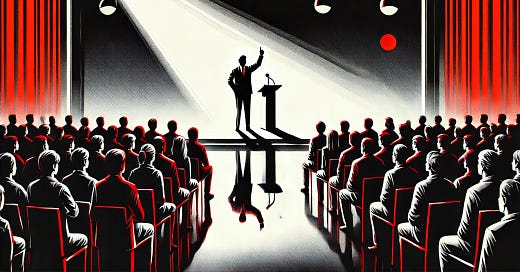Legacy in Motion: Arendt, Ifá, and the Force of Intentional Action
What Ashé and Political Action Teach Us About the Power of Speaking, Moving, and Shaping the Future
“Words must be matched by action. Action must be driven by truth. And truth must serve the destiny of the people.”
— Ifá Proverb
When Hannah Arendt wrote The Human Condition, she wasn’t offering a management theory or a political campaign playbook. She was asking a much deeper question:
What does it mean to act—to truly act—as a human being in public life?
For Arendt, action was not mere activity. It wasn’t efficiency. It wasn’t doing for the sake of doing. It was something far more sacred: the beginning of something new—a gesture into the unknown that revealed who we are and what we stand for.
And here, once again, the ancient African wisdom of Ifá offers a stunning parallel.
Where Arendt speaks of action, Ifá speaks of Ashé—the generative life-force that lives in speech, in movement, in moral conviction. If Arendt names the condition, Ifá names the power that flows through it.
Ashé: The Energy of What Matters
In the Yoruba worldview, Ashé is not just energy—it is agency.
Ashé is the force that animates a word when it is spoken with alignment. It is what gives a prayer its power, a song its soul, a decision its consequence. And crucially, Ashé is not neutral. It depends on Ìwà—on character, on moral clarity.
You may speak, but without Ìwà, your words carry no Ashé.
You may act, but without Ìwà, your actions dissipate.
Ifá teaches that every act is a spiritual and social intervention. There is no such thing as inconsequential leadership.
Similarly, Arendt reminds us that true action—real action—is always public. It’s how we appear in the world. It’s what we set in motion, intentionally or otherwise. It’s not measured by productivity, but by impact over time.
In both systems of thought, to act is to begin. And to begin is to bear responsibility.
Busyness vs. Legacy
One of the quiet dangers in contemporary leadership is the cult of busyness.
The calendar is full. The inbox is endless. Decisions are fast. Motion is constant. And yet… what is being set in motion?
It’s entirely possible to move quickly and go nowhere. To speak often and say nothing. To do much and change nothing that matters.
Arendt would call this labor—the repetitive, exhausting maintenance of systems. Ifá would call it acting without Ashé—movement disconnected from destiny.
And so the real question facing leaders today is not, “Are you active?” It’s, “Are you intentional?” “What are you actually invoking with your words, your strategy, your presence?”
The Ashé of Speaking Truth
Arendt once wrote, “Speech and action reveal the unique identities of human beings.”
In Ifá, this is beautifully echoed by the proverb:
“A word spoken from the belly of Ìwà cannot be undone.
It becomes rain, and rain will touch all things.”
When we speak with alignment—when we move from integrity—our actions ripple. They create legacy. They carry weight beyond our titles, our resumes, our quarterly results.
The Babaláwo, the Yoruba priest or diviner, does not merely recite verses. He awakens Ashé through ritual speech. His words are not ornamental. They are catalytic. Every utterance is made in conscious relationship to consequences.
Executives, entrepreneurs, and consultants could learn from this. You don’t need a shrine. But you do need a practice of speaking with intention, pausing to consider: What force am I releasing into this room, this system, this future?
Because leadership is not just about what gets done. It’s about what gets remembered.
And what gets remembered depends on what is spoken, what is acted upon, and what is risked.
Acting When It Counts
Legacy is not always built through grand gestures. Sometimes, it’s the quiet moment when you decide to say something unpopular in a meeting. Or when you name the truth that others are avoiding. Or when you choose to change a policy that “works” but doesn’t work for the people it affects. In Arendt’s world, these are acts. In Ifá’s world, these are movements of Ashé. In both, they are sacred.
And unlike trends or tactics, these kinds of actions live on. They shape cultures. They change futures. They become part of the story others tell when you’re no longer in the room.
Closing Invocation
We are all creators of legacy. Not through what we plan, but through what we set in motion.
Ashé reminds us: energy follows intention.
Arendt reminds us: action reveals identity.
So as you move into your next decision, next pitch, next hire, next conversation—pause. Ask yourself:
Is this action aligned with the future I want to build?
Does this decision carry the weight of my Ashé?
Will this moment be remembered for its truth—or forgotten in its convenience?
Leadership begins not with power. But with a word. A step. A choice.
Choose well. Move with Ashé.
Reflect With Us
When was the last time your action truly changed something—not just for today, but for the long arc ahead?
How do you recognize when your words carry Ashé?
What would it mean to lead less for outcomes, and more for legacy?
Tag someone who leads with intention. Or share how you bring Ashé into your leadership journey.
Ashé!
Tilo Plöger de Àjàgùnnà
DAILY IFÁ BUSINESS





